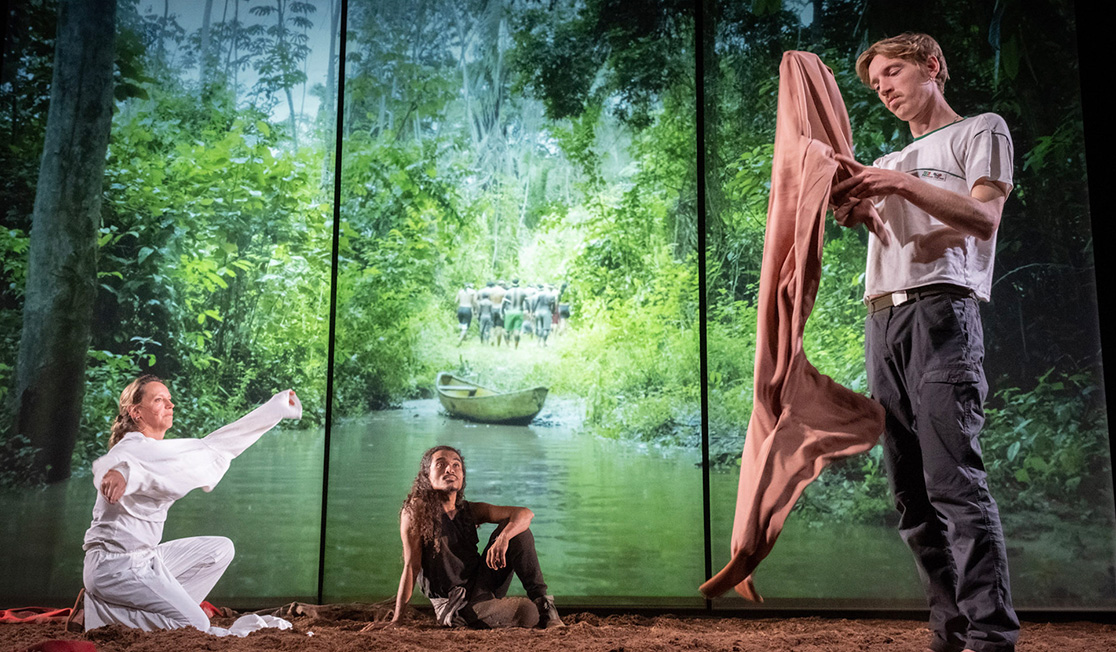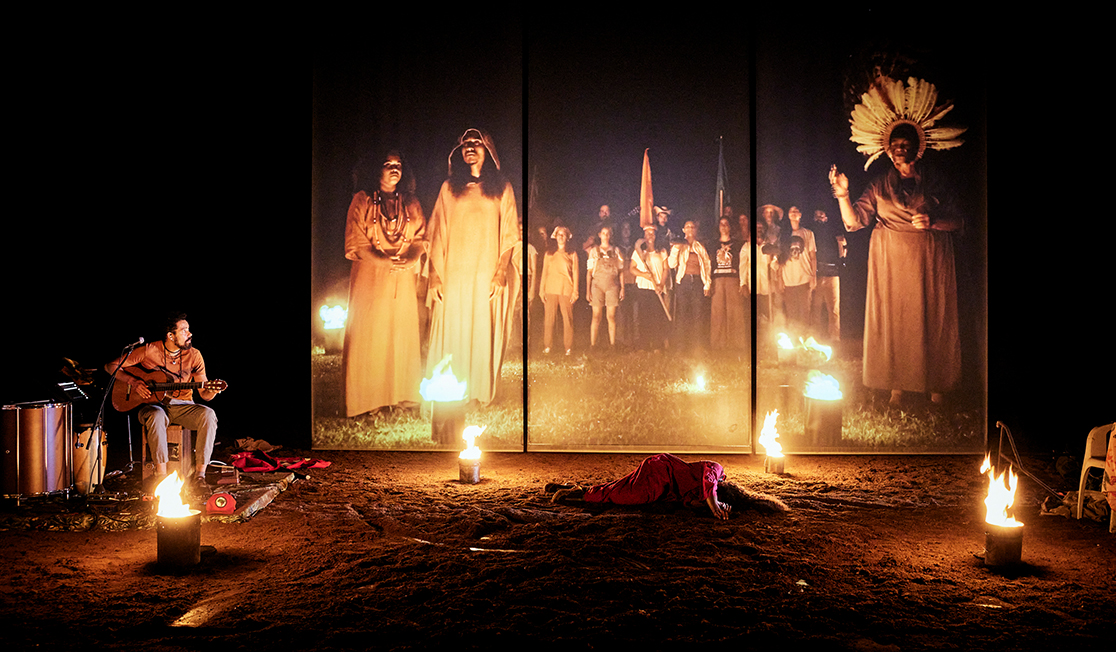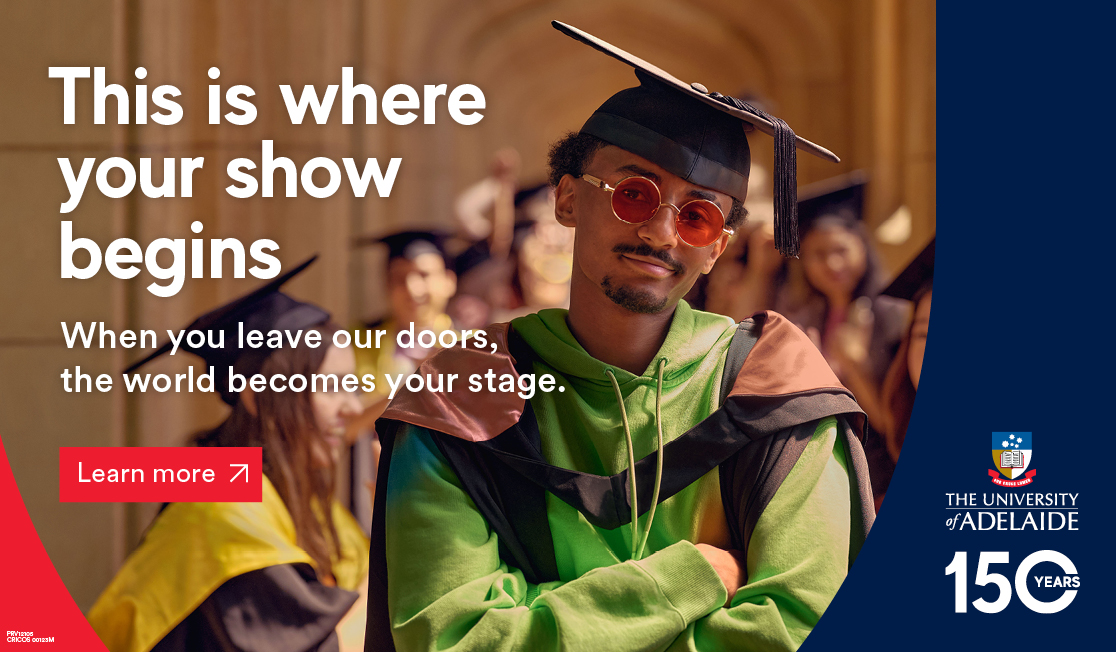Antigone in the Amazon Show Program
Antigone in the Amazon Show Program content

Theatre | Australian Premiere
Antigone in the Amazon
Milo Rau / NTGent & MST
Dates: 15 - 17 Mar 2024
Venue: Dunstan Playhouse, Adelaide Festival Centre
Duration: 1hr 50mins, no interval
Warnings: Strong language, depictions of violence and references to suicide. Firearms with blanks are used in the production. Contains smoke and prolonged smoke effects.
Note: Performed mainly in Portuguese and Dutch. Other spoken languages are English and Tucano. English surtitles are used throughout. Latecomers will not be admitted.
Supported by Goethe Institut Saõ Paulo, PRO HELVETIA programme COINCIDENCIA - Kulturausch Schweiz - Südamerika, The Belgian Tax Shelter.

Contents
Credits
Synopsis
Program Note
About the Cast
About Milo Rau
About the Making-Of Documentary
Adelaide Festival is committed to sustainability and does not offer printed programs for most works. Our digital show programs have a contents section for easy navigation. If you would prefer a pdf that you can download or print at home, please click here >>
PRODUCTION
NTGent
CO-PRODUCERS
The International Institute of Political Murder (IIPM), Festival d'Avignon, Romaeuropa Festival, Factory International (Manchester)(Manchester International Festival), La Villette Parijs, Tandem - Scène nationale (Arras Douai), Künstlerhaus Mousonturm (Frankfurt), Equinoxe Scène Nationale (Châteauroux), Wiener Festwochen,
IN COLLABORATION WITH
Movimento dos Trabalhadores Rurais sem Terra (MST)
ORIGINAL CAST
Pablo Casella, Frederico Araujo, Arne De Tremerie & Sara De Bosschere
CAST IN ADELAIDE
Pablo Casella, Frederico Araujo, Janne Desmet & Joeri Happel
ON SCREEN
Kay Sara, Gracinha Donato, Célia Maracajà, Choir of militants of Movimento dos Trabalhadores Rurais sem Terra (MST), & as Tiresias, Ailton Krenak
CONCEPT & DIRECTION
Milo Rau
TEXT
Milo Rau & ensemble
DRAMATURGY
Giacomo Bisordi
DRAMATURGICAL COLLABORATION
Douglas Estevam & Martha Kiss Perrone
ASSISTANT DRAMATURGY
Kaatje De Geest & Carmen Hornbostel
COLLABORATION TO CONCEPT, RESEARCH & DRAMATURGY
Eva-Maria Bertschy
MUSICAL COMPOSITION
Elia Rediger & Pablo Casella
SET
Anton Lukas
COSTUMES
Gabriela Cherubini, Jo De Visscher & Anton Lukas
LIGHT
Dennis Diels
VIDEO
Moritz von Dungern
VIDEO MAKING OF
Fernando Nogari
VIDEO EDITING
Joris Vertenten
DIRECTION ASSISTANT
Katelijne Laevens
INTERNSHIP DIRECTION ASSISTANT
Chara Kasaraki & Lotte Mellaerts
PRODUCTION MANAGEMENT
Klaas Lievens & Gabriela Gonçalves
ASSISTANT PRODUCTION MANAGEMENT
Jack Do Santos
TECHNICAL PRODUCTION MANAGEMENT
Oliver Houttekiet
STAGE MANAGER
Marijn Vlaeminck
TECHNIQUE
Brecht Beuselinck, Stijn Pauwels & Stavros Tarlizos
Synopsis
Antigone in the Amazon marks the conclusion of award-winning Swiss Director/Playwright Milo Rau’s Trilogy of Ancient Myths. Rau’s collaboration with Brazil’s Landless Workers Movement and Belgium’s NTGent’s global ensemble, is a thought provoking, relevant, modern interpretation of Sophocles’ classic, Antigone.
Described as a tragedy with purpose, Antigone in the Amazon is a powerful narrative that brings together indigenous communities, activists and actors from Brazil and Europe and uses Ancient Greek theatre tropes as a symbolic lens through which the devastating repercussions arising from the aftermath of the 1996 Eldorado do Carajás massacre are exposed.
Following in the footsteps of Brecht, Rau lays bare the theatrical process and adeptly brings real-life events to the stage through a dynamic interplay of live performances and film. The production vividly captures the relentless encroachment of capitalism on nature, and paints a poignant picture of the consequences faced by indigenous communities.
Rau is passionate about the creation of new classics by rethinking the institution of theatre, "in depth, like Tschechow, Camus or Shakespeare did it for their time. New art for a new society". His powerful ‘new art’ seamlessly fuses technolgy with the raw essence of the human experience, and the impact of this performance is destined to leave an indelible mark on its audiences long after the performance ends.
Program Note
"Many things are monstrous, but nothing is more monstrous than man," says the most famous and most adapted play in tragedy literature, Sophocles' Antigone. The play focuses on the conflict between Antigone and Creon, between traditional society and the modern, capitalist state. For ‘reasons of state’ Creon does not want to have Antigone's brother buried and violates the law of the gods - plunging his family and the entire city into disaster. Thus, in the 7th century, Antigone emerges as perhaps the most radical critique of what would later be called ‘Western civilisation’ and conquer the entire world: a dark song about the limits of enlightenment and the dangers of exploiting nature.
If in the time of Sophocles the apocalypse sung about in Antigone was a sinister notion, in the age of the Anthropocene it has become a fact. Therefore, in April 2023, Milo Rau and his team restaged Antigone as a global endgame in Pará, the northernmost state of Brazil, on the edge of the Amazon. Because here the future of humanity is at stake and with it every form of live on earth.
During the covid pandemic, the attack of the Brazilian agribusiness and their European partners - from Ferrero to Nestlé – on the largest contiguous primeval forest of the earth, still intensified. Not only the green lung of the planet is threatened, but also the people living there and their millennia-old traditions.
ABOUT RAU’S TRILOGY OF ANCIENT MYTHS
After the globally debated production Orestes in Mosul in the former capital of the Islamic State and the Jesus film The New Gospel in the refugee camps of southern Italy, Rau and his team now travel to the Amazon Basin in Brazil for the conclusion of their Trilogy of Ancient Myths. Together with indigenous people, activists and actors from Europe and Brazil, Sophocles' Antigone is being recreated on an occupied highway as a bloody clash between traditional wisdom and global turbo-capitalism; an epic of humanity's struggle against its self-inflicted downfall in greed for profit, blindness and hubris. And not least as a question to art itself: What can committed art achieve? Can art help where politics fails?
After political projects like The Congo Tribunal and General Assembly, and narrative and representational pieces like The Europe Trilogy, Compassion and La Reprise, Milo Rau has recently turned to the founding myths of Western civilisation. In Mosul, until 2017 the Iraqi capital of Islamic State, Rau and his team staged Orestes in Mosul (2019) based on Aeschylus' Oresteia with Iraqi and European actors. In the middle of the war zone, the ensemble, together with the Mosul Academy of Fine Arts, asked perhaps the most pressing question of all civilisations: How can the tragic end, how is forgiveness and thus a new beginning possible? The theatre project gave rise to a film school that Rau and NTGent founded together with the Mosul Academy of Fine Arts and UNESCO.
"Milo Rau's film class makes history," headlined art.tv. Arab News summarised: "Young Iraqi film students tell their own stories from Mosul". The short films of the first class of students are currently touring European film festivals, and a Mosul film festival (Mosul Biennale) is in preparation.
With The New Gospel (2019/20), which premiered at the 2020 Venice Film Festival and won among other awards the Swiss Film Prize, Rau and his team worked with refugees, laypeople and actors from Pasolini and Mel Gibson's Jesus films to adapt the social revolutionary message of the New Testament for the 21st century - sparking a revolt for the rights of migrants exploited by the mafia on tomato plantations in southern Italy. As part of the filming, distribution of the film and a fair tomato distribution system, over a thousand southern Italian refugees have been regularised. The New Gospel thus comes closest to what Milo Rau calls micro-ecologies in his book Theatre is Democracy in Small: "unlikely collectives, alternative production and distribution systems of dignity" that use the capitalist system to humanise it”.
And now, after the Oresteia in Mosul and the Bible in southern Italy, Sophocles' Antigone is restaged together with the landless movement, indigenous activists and actors from Europe and Brazil. Antigone in the Amazon, which Rau and his team have been preparing since 2019, concludes Rau's engagement with the great myths and questions of humanity.
ABOUT ANTIGONE IN THE AMAZON
As in the previous projects, Rau's question is: which actors, which political constellation allows this text about the clash between traditional and modern society to speak to us anew? How can theatre create alternative narratives to the real-utopia of a more just and humane civilisation after capitalism? How can we overcome tragic thinking together? For the staging of their Antigone for the 21st century, the director and his team therefore go to the Brazilian state of Pará, where soy monocultures are expanding into the burning forests of the Amazon and capitalism is - as it were - eating up nature. At the invitation of and in collaboration with MST (Movimiento dos Trabalhadores Sem Terra), the world's largest landless movement, they created an educational play about the violent devastation and displacement caused by the modern state, which places private property - and thus global trade and speculation - above the traditional right to land.
About the Cast
As in Orestes in Mosul or The New Gospel, European and local actors, amateurs and professionals meet in Antigone in the Amazon. Here, too, those affected tell their own stories and subject the most famous tragedy in European literature to a completely new reading.
The role of Antigone is played on screen by Kay Sara, an indigenous activist.
The chorus is made up of survivors of a massacre by the military police in 1996 and activists of the landless movement. Creon and Haimon are played by the two Belgians Janne Desmet and Joeri Happel. The Brazilian actor Frederico Araujo plays the role of Polynices, the guard and (on stage) Antigone. Ismene and Eurydice are played by the Brazilian actresses Gracinha Donato and Célia Maracajà. Finally, in the role of the blind seer Teiresias, who predicts Creon's self-destruction, appears Brazilian indigenous activist and philosopher Ailton Krenak.
CAST IN ADELAIDE
Pablo Casella, Frederico Araujo, Janne Desmet and Joeri Happel
ON SCREEN
Kay Sara, Gracinha Donato, Célia Maracajà, Choir of militants of Movimento dos Trabalhadores Rurais sem Terra (MST), and as Tiresias, Ailton Krenak
ORIGINAL CAST
Pablo Casella, Frederico Araujo, Arne De Tremerie and Sara De Bosschere
Sara, Arne, Janne, Joeri, Frederico, Pablo and the Brazilian actors on screen are all members of the Global Ensemble of NTGent.
About Milo Rau
Milo Rau, born 1977 in Bern (CH), is director, writer, filmmaker and the departing artistic leader of NTGent. Rau studied sociology, German and Romance languages and literature in Paris, Berlin and Zurich with Pierre Bourdieu and Tzvetan Todorov, among others. Critics call him the "most influential" (Die Zeit), "most awarded" (Le Soir), "most interesting" (De Standaard), "most controversial" (La Repubblica), "most scandalous" (New York Times) or "most ambitious" (The Guardian) artist of our time. Since 2002, he has published over 50 plays, films, books and actions. Rau's theatre productions have been shown at all major international festivals, including the Berlin Theatertreffen, the Festival d'Avignon, the Venice Biennale, the Vienna Festival Weeks and the Brussels Kunstenfestivaldesarts, and have been touring in over 30 countries worldwide

About the Making-Of Documentary
The public filming and world premiere of Antigone in the Amazon is followed, as a theatrical video installation, by a tour of Europe carried out jointly with the Landless Movement. The Brazilian director Fernando Nogari, known for his video clips for the singer Selena Gomez, created a behind-the-scenes film about Antigone in the Amazon, documenting the political background, the rehearsal and production process, and in general the political situation in what is probably the decisive hotspot of our time. The film follows the creation of Antigone in the Amazon from the start of rehearsals for the project in 2020 to the re-enactment of the largest massacre by the military police against the Landless Movement at the scene of the crime on the April 17 2023. The documentary premiered during the Festival d’Avignon on the 18th of July

From Adelaide Festival & Partners
Partnering for Conservation
Adelaide Festival and Wilderlands currently safeguard 3,424m² of the Coorong Lakes habitat.
Help us reach 5,000m² by claiming your free 1m² by 22 April 2024 - take action here.
The UNIVERSITY OF ADELAIDE | Learn more >>

